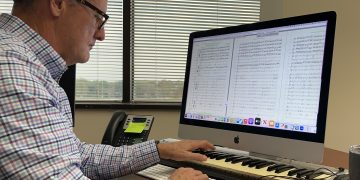SBO+: This is the first in a series of articles explaining common practices used by publishers and state MEAs in grading music. Future articles will focus on grading practices for string orchestra, chorus, jazz band, and marching band.
Selecting music for your band is the most important decision you make as a teacher. It is your curriculum. The growth and success of your students depends on you selecting pieces that fit the technical limitations based on their level of maturation. Often directors look to grading systems to determine if a piece will “work” with their band, but they become confused by the discrepancy between what is considered a grade 2 in one part of the country compared to another, or what grade 2 means from one publisher to another. What is a director to do?
First and foremost, a director needs to carefully determine the technical requirements they feel meet the needs of their students at each developmental level. So how do you do this? What is included when determining grade levels for the music you use with your students?
Some publishers and states have rubrics and there is a commonality of these items:
1. Instrumentation – For younger students, there is safety in numbers. Having more individual parts (i.e. more than one trumpet part) generally makes a piece more difficult. The more advanced the piece the more instruments and independence of those parts. If you need pieces for your beginning band, look for music that has less instrumentation and less independence.
2. Range – This is the first thing most directors look at when selecting literature. If ranges are too extreme, then your students will not be successful. Also, look for discrepancies of range within a piece. For example, if a piece generally seems to be a grade 2 but the trumpet part has a high C above the staff, then it will not work for your students.
3. Length – How long a piece is helps determine the grade level. Younger students do not have the stamina or concentration to play lengthy works. Of course, mature players can be expected to handle more involved works of greater duration.
4. Keys – There is a progression in the way band students are taught. To establish success with students it is best to start with keys that sound better on wind instruments and then build from there. Could a beginning band learn to play a piece in a key such as D major? Of course, but getting it to sound good will be more difficult because of the acoustical nature of the wind instruments.
5. Time Signatures – Similar to keys, time signatures are taught in an order from simple to more complex.
6. Rhythms – The more complex the rhythmic usage, the more difficult the music will be for your students.
These are the basics, and based on your pedagogical sequence you can determine what grade level you think a piece is using this criterion. This does not, however take some intangibles into consideration. Music can look really easy rhythmically and still be more difficult than it appears, especially if it is a more lyrical piece. If the literature you select has more musical demands, it may seem easy but will be more challenging for younger students. Another aspect may be the harmonic language the composer uses. The more complex the harmony, the more challenging the piece will be to understand for the students, and to tune.
Grading music is something I have spent most of my career doing as an editor for three different publishing companies. We work really hard to make sure the music that we publish fits into the grade levels we advertise. Sometimes we might miss the mark based on intangibles, but for the most part we are pretty close with technical demands.
It is essential that you don’t try to determine the difficulty of a piece by listening to the recordings only. You must look at the score and analyze every part so you know how difficult each one is for your students. If you do that, you will be better prepared to use the pieces you select to teach your students. Now, let’s dive in to what we use as a guide for our grading system. Use this as a starting point when picking literature.































